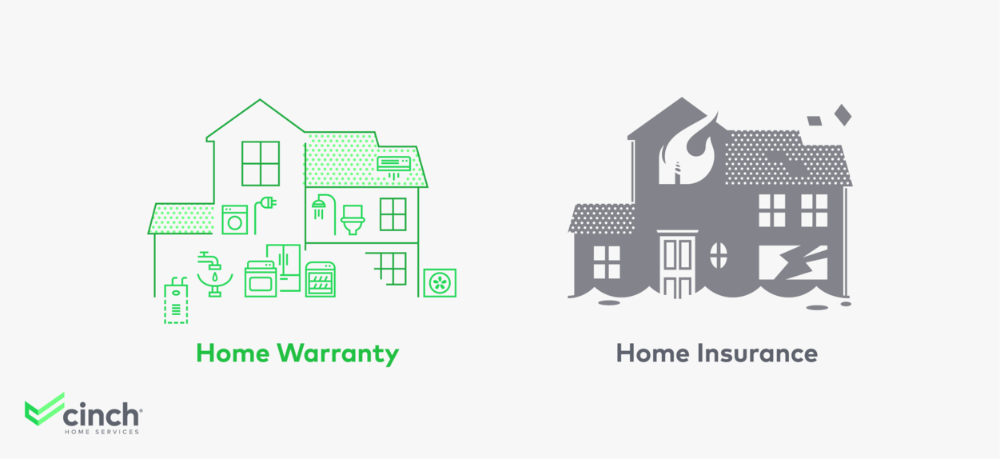Home Warranty vs. Home Insurance: What Are the Differences?
Key takeaways:
Home warranties and homeowners insurance cover different aspects of a home, with insurance focusing more on catastrophic events and warranties sometimes addressing wear and tear on systems and appliances.
While homeowners insurance is typically required for a mortgage, home warranties are optional but offer peace of mind for repair or replacement of aging systems and appliances.
The cost of home warranties can sometimes vary based on the plan and provider, while homeowners insurance costs are influenced by other factors.
Homeowners should carefully review the terms, coverage limits, and exclusions of both their home insurance policies and any considered home warranty plans to understand what is and isn't covered.
First-time homebuyers, in particular, might find value in exploring home warranty options to help mitigate the financial burden of unexpected repairs or replacements on appliances and systems.
If you have ever come close to buying your first home, you must have wondered what the difference is between a home warranty vs. home insurance. We’re here to clarify it by diving into the differences and discussing some of the essential aspects of each.
For starters, it’s important to note that homeowners insurance and home warranty coverage can be vital parts of home ownership. And the data available shows that people are aware of both options. In coordination with Munich Reinsurance America, Inc., a recent survey by the Insurance Information Institute (Triple-I), revealed that 88% of homeowners purchased homeowners insurance in 2023. Meanwhile, the home warranty industry continues to flourish as well. According to an investigative article from ConsumerAffairs, approximately 1.4 million (25%) out of the 5.64 million homes sold in 2020 had home warranty coverage.
What is a home warranty?
Home warranty coverage is a service agreement between a homeowner and a company that states the terms under which the company will help cover the repair and maintenance costs of home systems and appliances for a given period.
What is homeowners insurance?

Forbes.com defines homeowner’s insurance as “an agreement between a homeowner and a third-party insurer that protects the homeowner’s investment against accidents, building failures, and natural disasters.
The difference, in a nutshell
So, what’s the difference? Here’s an easy way to explain the difference between homeowners insurance and a home warranty. Homeowners insurance relates to catastrophic, unforeseen events such as accidents, fires, and natural disasters. Home warranty protection, on the other hand, is related to the appliances and systems in your home. When things such as your HVAC or refrigerator stop working, a home warranty plan is probably worth it and may make it easier (and cheaper) to repair or replace it.

What do homeowners insurance policies cover?
The first major difference between a homeowner's insurance policy and a home warranty is that homeowner's insurance is usually mandatory, and a warranty plan is not. Before issuing you a mortgage, a bank usually requires you to purchase a standard homeowner's policy and retain it throughout the life of the mortgage. This insurance policy protects you from big-picture issues and unexpected perils ranging from theft of property to major damage brought on by fires, floods, or other natural disasters.
Homeowners insurance, also known as home insurance, covers four primary areas of the home, including:
- Personal property that could be stolen or damaged
- The interior of your home
- The exterior of your home
- General liability that occurs if someone gets injured on your property
What about weather and disaster coverage?
If your basement were to flood due to a storm, a fire or an earthquake were to ruin the structure of your home, an insurance adjuster would come to your property and fill out a claim for any damaged belongings you could claim. Most insurers insist on documentation, so it’s a good idea to photograph, describe and value all the items in your home that you’d need to claim in the event of a natural (or unnatural) disaster (or accident). After the insurer approves your claim for the loss of your belongings, the insurance company will issue you a payment after subtracting the amount of your deductible from the total balance to cover the cost of your loss and repair claims.
What do home warranty plans cover?
Home warranties generally cover daily wear and tear failures to your home’s major appliances and systems, typically including refrigerators, dishwashers, ranges, ovens, microwaves, washers, dryers, and garbage disposals. It also includes other built-in appliances, water heaters, HVAC systems, heating or cooling systems, plumbing and electrical systems. Other aspects of your home that a more customized home warranty could also cover, perhaps through add-ons, include septic systems, sprinkler systems, telephone systems, roofs and foundations, fireplaces and chimneys, attics and exhaust fans, water softeners, water/sump pumps, garage doors, spas, wells, pools and more.
Solving the repair-or-replace burden
Many homeowners struggle when unforeseen issues happen in their homes and face a tough financial choice: repair or replace. For example, water heater repair or replacement can be a significant expense and could seriously throw off your monthly budget if you had to handle the cost out-of-pocket. A home warranty* company helps spare you that financial burden and the surprise hit to your savings or credit cards that could come with it. That’s why millions of homeowners nationwide have warranty plans from companies like Cinch in addition to their homeowners insurance policies. Having both types of plans provides peace of mind, knowing your home and your family are taken care of whenever day-to-day issues or completely unexpected problems arise.
All Major Differences: Home Warranty vs. Home Insurance
| Home Warranty | Homeowners Insurance | |
| Cost | Varies based on the plan selected | Similar across different providers, can be different |
| Legally required | No | No, but banks do require it as part of a mortgage |
| Plumbing system | Often covers repairs and malfunctions of pipes, faucets, and toilets | Usually covers damage due to sudden and accidental events like burst pipes, but not wear and tear |
| Electrical system | Typically covers electrical system malfunctions | Covers damages from events like fires or lightning strikes, but not system breakdowns due to aging |
| HVAC System | Often includes coverage for repairs or replacement of heating and air conditioning units | Covers damages from specific events (e.g., fire, vandalism), but not breakdowns from age or wear and tear |
| Major Appliances (e.g., fridge, dishwasher) | Usually covers repairs or replacement due to wear and tear | Generally does not cover appliance malfunctions unless damaged during a covered event (e.g., fire, theft) |
| Roof | Some plans may offer limited coverage for roof leak repairs. Check the terms of the plan you’re interested in to be certain | Covers roof damage from events like fires, storms, and other natural disasters, but not deterioration due to age |
| Structural Components (e.g., walls, floors) | Not typically covered | Covers damages to the structure of the home from covered events like natural disasters, fire, vandalism |
| Personal Property (e.g., furniture, electronics) | Not covered | Covers damage or loss of personal property due to covered events like theft, fire, and natural disasters |
Each home warranty plan will vary according to the company offering it and the coverage options it’s designed to offer. The list above should give you a good idea of what aspects are generally eligible for coverage and which additional items you can sometimes add to your home warranty coverage plan. You can always ask if you don’t see something listed that you’re wondering about. Reputable home warranty companies offer a wide range of a la carte items that can provide complete coverage to customers who have unique or unusual systems and appliances. Always know what you’re signing and how much coverage you’re paying for, and be aware of any exceptions that may apply to your contract.
Who does your home warranty vs. insurance?
Now that we’ve defined home warranty and home insurance and provided some background on both let’s review how you can attain each. Homeowner’s insurance is provided by a home insurance company. There are many home insurance companies on the market for you to choose from, so make sure you research and select a company that fits your needs and budget.
On the other hand, a home warranty is provided by a home warranty company such as Cinch Home Services. Home warranties give you peace of mind that if your home appliances and systems stop working unexpectedly, you won’t have to come out of pocket entirely for a repair.
It’s important to note that some companies offer both home warranty and home insurance, even though they are technically two distinct products. This doesn’t impact the quality of either product and it can even be a good thing for customers who want to keep it simple by having their home protection handled by one company.
How a home warranty works
When purchasing a home warranty, you sign a service contract that usually lasts for a year, just as you would for an insurance policy, but the similarities end there. Home warranties generally cover essential home systems when they stop functioning properly due to age or frequent use, like heating, cooling, plumbing, and electricity, as well as major appliances like refrigerators, dishwashers, washers and dryers, water heaters, and more.
In short, a home warranty works as a 4-step process:
- You find and purchase a home warranty plan that works for you.
- When something in your home breaks or has an issue, you check your home warranty plan coverage and determine if it’s covered by it.
- If covered, you file a service claim online or by phone with your company.
- The company finds a licensed service technician in your area and schedules a service appointment.
- The service technician does an inspection on your home appliance or part covered by your warranty and determines the next course of action.
- The claim is further processed to cover repair (or in some cases, replacement).
- You pay the amount in the claim based on your home protection plan agreement details, like deductible, coverage, etc.
How home insurance works
Homeowner’s insurance works like most of the insurance policies that you may have in your life. For starters, you would buy a policy through an insurance agent, where you’ll pay a monthly premium. In exchange, the insurance company agrees to cover you if an incident occurs. According to Policy Genius, a standard homeowners insurance policy is made up of the following six coverages:
- Dwelling: Covers the cost of damage to the structure of your house as well as the garage and patio.
- Other structures: This covers things such as a guest house or fence.
- Personal property: This is where things such as your clothing and shoes come into play.
- Additional living expenses: This covers your meals and any relocation costs.
- Personal liability: This provides coverage for things such as lawsuits and property damage.
- Medical expenses: This covers medical expenses regardless of who’s at fault.
The cost of home warranties vs. home Insurance
So, now that we have spent time breaking down the pros and cons of both home warranties and homeowners insurance, let us look at each price. Whether you’re on a tight budget or not, we can’t blame you for wanting the best possible deal on the market.
According to Consumer Affairs, home warranty plans range from $450 to $600 annually, with an average monthly payment of $40 to $60. Service call fees can range from $75 to $150 per visit. How do these prices stack up against typical homeowners insurance costs? Insurance.com states prices can range from $582 to $5,000 plus, based on your state and coverage selections.
Home warranties and first-time homebuyers

The importance of home warranties is especially apparent for first-time home buyers who are under even more financial strain when purchasing their first house than someone who is upgrading to their next home. A little extra confidence and peace of mind about what is often an already overwhelming, anxiety-producing decision can go a long way for a first-time homebuyer.
Not being hit hard financially for repairs and replacement of major home systems and appliances right out of the gate into home ownership is a welcome sigh of relief. Home warranty coverage not only fills the gaps in coverage left by your homeowner's insurance policy but also helps protect you from unpredictable appliance repair or replacement costs.
Closing the home protection coverage gap
This isn’t Medicare. However, there’s still a coverage gap we need to address - the gap between what your homeowner's insurance covers and what you need to keep your home running smoothly and comfortably if one of your many major systems or appliances needs service. A home warranty picks up this coverage gap where your homeowner's policy falls short — and it can be a costly gap.
Why do you need homeowners insurance and a home warranty?
Investing in home insurance and a home warranty plan is essential because they cover different types of damage. Suppose your roof starts leaking, and your HVAC system stops heating in the middle of the winter. In that case, you will need an insurance policy and a home warranty to fix these problems and create a safe and comfortable living environment for your family. So, what are the cons of a home warranty? Very few, as it turns out. Sure, you could avoid monthly or annual payments without a home warranty, but as we’ve shown, a single, serious repair could wipe out all those gains and then some in one disastrous day — if you elect to do without home warranty coverage, that is.
Can you use home insurance and home warranty at the same time?
Technically, yes. If you have an issue with an item covered by your home warranty and your home insurance, you can file both claims at the same time using your home warranty and insurance. Remember, it’s not about the timing but the coverage details allowing you to use both products simultaneously.
However, you cannot use one or the other for items not covered as stated in your official agreement. For example, you cannot file a claim for a refrigerator issue with your home warranty and insurance, as the insurance usually doesn’t cover that.
Your home warranty of choice: Cinch home protection plans
Again, at Cinch Home Services, we offer home protection plans that fit your specific needs with the ability to choose an Appliance plan, Built-in Systems plan, or Complete Home plan while allowing you to cover additional items. With an annual plan from Cinch Home Services, you can pay in one lump sum, or break the annual amount into monthly payments. When something breaks, you pay a service fee (or deductible) for our service partners to come to your home to diagnose the problem. The service fee is your share of a covered repair or replacement event, not including any non-covered charges or amounts over caps and limitations that may apply. With our deep bench of experienced professionals, our plans cover damage incurred from daily wear and tear to your home’s appliances and major systems according to your plan’s terms and conditions. Once you request service, we send one of our 14,000 service providers to assess the damage and repair or replace your equipment or appliance.
* Subject to plan terms and conditions.
*The information in this blog library is intended to provide general guidance on home warranties, and on the proper maintenance and care of systems and appliances in the home. Not all of the topics mentioned are covered by our home warranty or maintenance plans. Please review your home warranty contract carefully to understand your coverage.
*Our blog library may link to third-party sites that offer products, services, coaches, consultants, and/or experts. Any such link is provided for reference only and not intended as an endorsement or statement that the information provided by the other party is accurate. We are not compensated for any products or services purchased from these third-party links.
The differences between home warranty and home insurance are significant, but both help protect your home in the long run.

